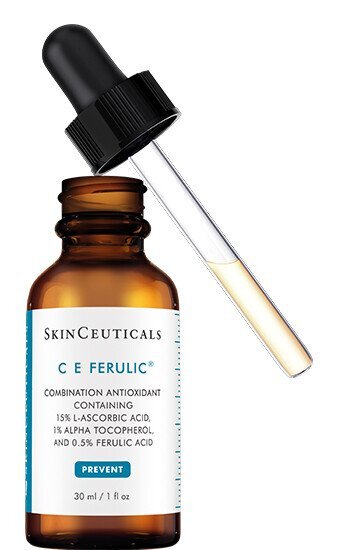Choosing a Vitamin C Skincare Product
FORMS OF VITAMIN C
Vitamin C is very effective in its pure form, however it is highly unstable. This makes it difficult to formulate as it can degrade when exposed to oxygen, light, water and high pH. The most common types of Vitamin C used in skincare products are L-ascorbic acid, sodium ascorbyl phosphate and magnesium ascorbic phosphate.
L-Ascorbic Acid is the most potent form. It has a low pH and not suitable for sensitive skin types. When combined with Ferulic acid and/or water free L-Ascorbic Acid are more stable. However, water free versions are not optimal for oily or acne prone skin.
Tetrahexyldecyl Ascorbate is the new kid on the block. It is a stable, oil soluble form of Vitamin C. Since it is oil soluble, it can penetrate the epidermis and dermis and is known for more collagen stimulation.
Sodium Ascorbyl Phosphate is a gentler form and great for sensitive and acne prone skin. It has a neutral pH and is more stable. Compared to L-ascorbic acid it is less effective.
packaging
Light, air and heat can degrade Vitamin C products, making them less effective or inactive. Look for products which come in dark, airtight packaging. Store the product in a dark place or consider a skincare refrigerator. Pay attention to the color of the product when you initially start using. If the serum start yellow and over time turns dark brown or orange, it has oxidized. On the other hand if it starts white or clear and turns yellow, it may have oxidized as well. Again, if the product oxidizes it becomes less effective.
concentration
A concentration between 10-15% is ideal. Try to avoid getting anything lower than 10%, unless you have very sensitive skin.
when to apply
It is a good idea to check the packaging of the Vitamin C which you choose to determine how often to apply. If you are not using a retinoid at nighttime, it is good to apply Vitamin C twice daily. Typically, it is applied after cleansing and using toner and prior to moisturizer and sunscreen. Although Vitamin C helps protect the skin from sun exposure, it is not a replacement for sunscreen.
SAFETY
Always check with your OB first, but topical Vitamin C is typically considered safe during pregnancy.
Vitamin C benefits
Vitamin C is an antioxidant, working to fight free radicals and pollution. When applied to the skin it helps to protect against sun damage, brightens the complexion, helps reduce hyperpigmentation (discoloration), increases collagen production and should be part of any anti-aging regimen. They have quickly become a cult favorite, but not all of them are created equal. Ready to find out the differences and what you should look for when picking the perfect product?
Not all Vitamin C Serums are created equal
favorite products
SkinCeuticals C E Ferulic
This has been the gold standard of Vitamin C serums for many years. It contains 15% L-Ascorbi Acid, 1% Alpha Tocopherol and 0.5% Ferulic Acid.
Cost: $165
Revision C+ Correcting Complex 30%
Combines MelaPATH technology, Sodium Carbosymethyl Beta-Glucan, Diglucosyl Gallic Acid and Tetrahexyldecyl Ascorbate (Vitamin C).
Cost: $160
SkinBetter Alto Defense Serum
Combines Vitamin C + E plus 17 additional antioxidant ingredients.
Cost: $155
ZO 10% Vitamin C Self-Activating
10% Ascorbic acid, Tetrahexyldecyl ascorbate, Tocopheryl acetate & Coenzyme-Q10, Squalane.
Cost: $93
TruSkin Vit C Serum
A blend of Sodium Ascorbyl Phosphate, Botanical Hyaluronic Acid, Vitamin E, Witch Hazel, and Jojoba Oil. It is plant based and cruelty free.
Cost: $20







